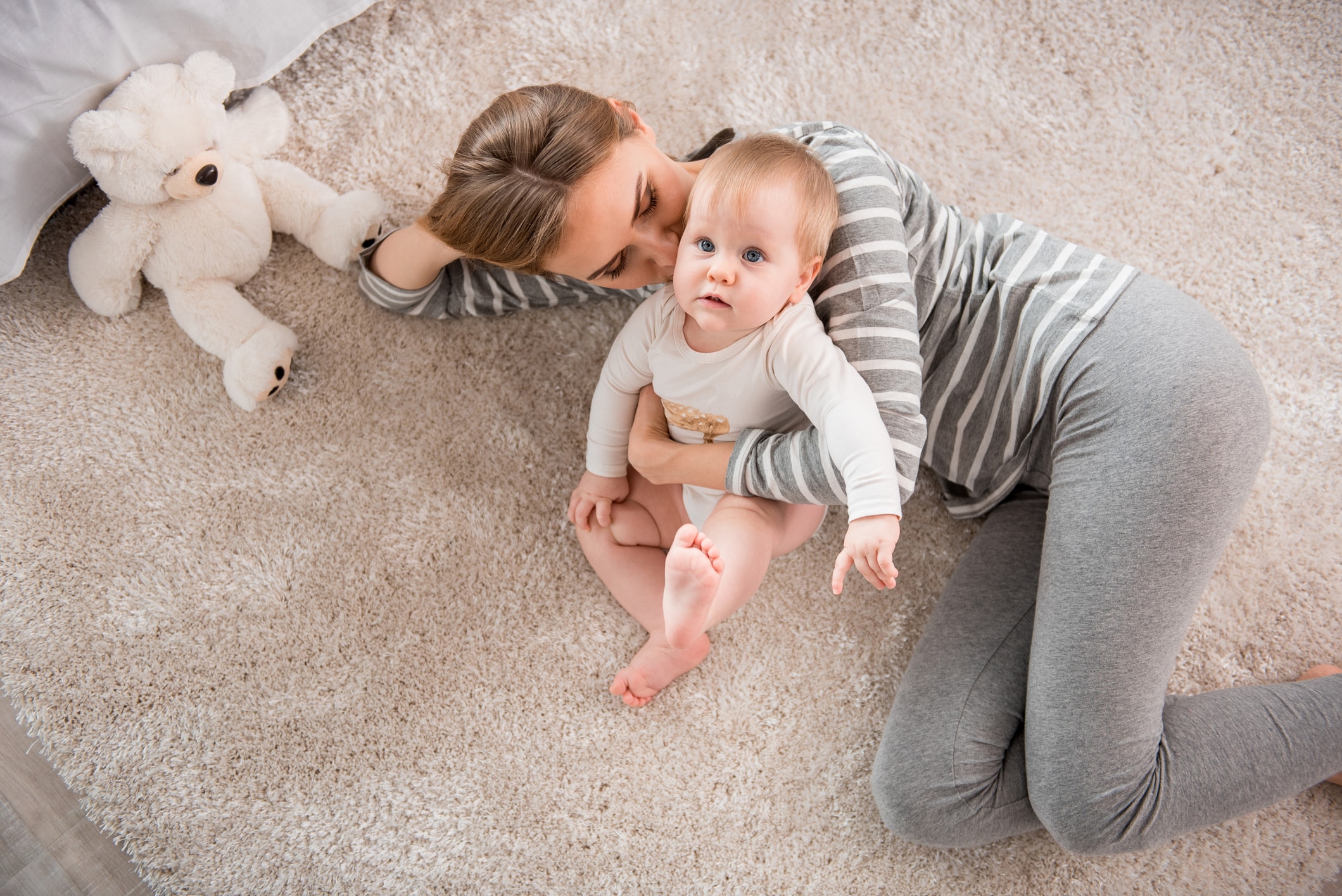In this article
In the same way that you probably wouldn’t ask your toddler to clean the bathroom, you also wouldn’t put your teenager fully in charge of meal planning and prep. There is a boundary between suitable expectations for your child and putting adult-level responsibilities on them — otherwise known as parentification, a responsibility role-reversal between child and parent.
Where that line lies may depend on the individual, their age and what they’re capable of. And it is ultimately the parents’ responsibility to educate themselves on what is developmentally appropriate. If parents neglect that step, they may be putting themselves at risk for parentification.
And when that happens, it can have a profound impact on “[a child’s] sense of self, self-worth, emotional health and self-regulation, as well as their attachment to their parent,” says Maggie Nick, licensed clinical social worker, trauma therapist, founder of Parenting With Perspectacles and co-founder of The Parenting With Trauma Project.
Parentification — when a parent and child essentially swap roles — is likely unintentional, she adds, which can make it that much harder to realize and address. But with careful reflection and the advice from experts and fellow parents below, you will be able to plot your course through this potential danger zone.
Key takeaways
- Parentification happens when children take on adult emotional or practical responsibilities that exceed what’s developmentally appropriate. Often unintentional, this role reversal can deeply affect a child’s self-worth, emotional regulation and attachment patterns.
- There’s a critical difference between healthy family participation and putting a child in charge. Chores and responsibility should support growth, not leave a child feeling chronically responsible for a parent’s emotions, siblings or household stability.
- Preventing parentification requires self-awareness, clear boundaries and outside support. Parents who reflect on their own upbringing, set age-appropriate expectations and rely on adult support systems protect their children’s mental health and sense of safety.
What is parentified? Parentification definition
In its most overarching sense, the definition of parentification is “a role reversal during which a child fulfills the parent’s role within the family system,” says Sarah Epstein, licensed marriage and family therapist. This can look like the parent consistently looking to their child for “support with grown up challenges,” such as mediating family conflict, says Nick.
Unfortunately, some people may be predisposed to parentification, including those who experienced it themselves as children, according to a study by Amy K. Nuttall, et al. in the Journal of Marriage and Family. “Parentification may initiate a negative cascade of intergenerational risk,” Nutall writes in the study. In other words, experiencing parentification in childhood yourself can adversely affect early parenting practices and, in turn, child behavior in the next generation, researchers say.
Nick adds, “We are more likely to see parentification in single parent households, with the oldest sibling(s) being most at risk. We also see [it] more in families where a parent is navigating mental health or physical health challenges, addiction and substance abuse, financial stress and parents fighting, separating and divorcing.
We see children move into parentification when they are experiencing abuse and/or neglect from the parent, in an attempt to feel close to the parent and get their emotional needs met.”
What are the types of parentification?
To complicate matters, parentification doesn’t fit a simple mold. It can take numerous forms and engulf various family members.
Emotional vs. instrumental
In emotional parentification, a child may end up “acting as their parent’s confidante or therapist” when it comes to adult situations, says Epstein. Or the parent may lean “on their child to be emotionally stable when they fail to be,” she adds.
In these situations, “parentified children carry the emotional load for the parent(s) and family while simultaneously not getting the emotional support and care they need to properly develop and regulate their emotions,” says Nick. This could look like a parent, at the end of a long day, offloading their adult-sized problems on their child’s ready ear, such as confiding in them about a fight with their coworker, concerns about making ends meet financially, or the stability of their housing.
On the other hand, when it comes to instrumental (or physical) parentification, “the child or teen is expected to consistently handle parent-level household tasks and chores, such as cleaning, cooking and shopping for meals, caring for younger siblings and caring for the parent if they’re dealing with addiction and/or mental health, medical or disability challenges,” explains Nick.
Parent-focused vs. sibling-focused
Parentification is further nuanced by the fact that the burden of responsibility can be focused on the parents, siblings or other family members. While parentification typically centers around the parent-child relationship), children may also find themselves caring for and providing emotional support for a sibling in the absence of an involved parent. They may feel this responsibility as a result of their parent’s expectations, or it may come in the vacuum of parental absence.
As a child, Kirstie Porter, senior copywriter at a rural health system in Wisconsin and parent of three, felt an increased pressure to protect her younger siblings. Reflecting on it, she says, “I think about that a lot now with my kids. I’m the parent; it’s my job to keep them safe.”
“Family participation is developmentally appropriate and grows as the child ages and is thoughtfully executed by parents teaching children how to be part of a unit and an independent adult. Parentification, in contrast, hands a child too much responsibility, forcing them to take on the parent’s role in the household.”
— Sarah Epstein, licensed marriage and family therapist
What are the effects of parentification?
Unfortunately, and perhaps unsurprisingly, parentification can have devastating and long-term effects on children. When their parent doesn’t meet their needs and instead leans on them, children learn “that the most lovable version of [themselves] is one who is focused on meeting the parent’s needs and ignoring their own,” says Nick.
This can impact their emotional, cognitive and social development, Nick adds. This can lead to a variety of downstream effects, such as:
- Emotional stress and dysregulation.
- Anxiety.
- Guilt.
- Physical and emotional exhaustion and burnout.
- A negative impact on a child’s academic and social/peer development, leading to an increased risk for anxiety, depression, eating disorders and low self-worth.
“Parentification also infiltrates a child’s attachment with their parent, the blueprint for how to be in a relationship with others,” notes Nick. “This can lead to dysfunctional relationships where the child recreates patterns of selflessness and provides emotional support while not receiving it from a partner or friend.”
How can I avoid parentification?
Childhood is, or should be, a relatively carefree time in a person’s life, but taking on the stressors of adulthood by providing inappropriate emotional and physical support to a parent can compromise that. Here are some ways you can keep your expectations for your child developmentally appropriate.
Check in with yourself first
Prevention here starts with awareness and self-reflection, Nick says, pointing out that if a parent was parentified, they are at great risk of parentifying their kids — ”period, the end.” “That is why it is so incredibly important for us to get curious about how we were parented and how we may have been parentified so we will be able to see the impact things have on our kids,” she notes.
To take this self-reflection a step further, therapy can also be amazing for healing, Nick adds. However, if cost is a barrier or additional input is desired, she also recommends utilizing the resources shared on social media and blogs by mental health clinicians and parenting experts.
Epstein suggests parents ask themselves two key questions: “Does it feel like I’m in charge of the household both emotionally and physically?” and “Do I sometimes lean heavily on my child for support and leave them feeling unsupported?”
Having experienced parentification herself, Marley Krois, a stay-at-home mom and parent of two in Minnesota, makes sure her children feel secure in their role within the family by examining those very aspects. “As a parent, I want to ensure that my kids know I am there for them,” she says. “I am the one who needs to be responsible. I have things under control.”
Ask yourself if your child is playing a supporting (or a leading) role in the family
It can be difficult, and even confusing, to navigate the line between encouraging family participation and teaching life skills (participating in household chores, for example), and expecting too much of a child. It is a nuanced aspect that boils down to “whether the child is playing a supporting role or is left to feel chronically in charge,” explains Epstein.
“Family participation is developmentally appropriate and grows as the child ages and is thoughtfully executed by parents teaching children how to be part of a unit and an independent adult,” Epstein continues. “Parentification, in contrast, hands a child too much responsibility, forcing them to take on the parent’s role in the household.”
“It is so incredibly important for us to get curious about how we were parented and how we may have been parentified so we will be able to see the impact things have on our kids.”
— Maggie Nick, licensed clinical social worker
Set appropriate expectations
When it comes to individual responsibilities, what is appropriate for one child may not be for another, and your expectations should adjust with them as they grow. For example, when it comes to household chores, expecting a 6-year-old to do their own laundry probably isn’t reasonable, but that may not be true in a few years.
It’s OK to not know what’s appropriate to expect for each stage from the get-go, says Nick. “But it is our responsibility to learn so we can have healthy expectations for our kids,” she notes.
It’s also important to choose your words carefully. For Porter, early in her parenting journey, she caught herself saying to her oldest, “‘It’s your job to keep [your younger brother] safe,’ and immediately regretted the words. Avoiding parentification,” she added, “for me, means being mindful of my words.”
Find other (adult) support systems
Parentification is more likely when the family unit is under stress, and this can lead to the adult(s) becoming so overburdened that they rely on their children. While it may be easier said than done, Epstein encourages parents to find external adult support systems. Instead of leaning on their children for emotional support or to fulfill household and financial tasks, she suggests they lean on friends, people in their community, religious support (if applicable), family members or other community organizations.
Check in with your kids
Life happens, and there may be special situations where more is expected of kids temporarily due to extraordinary, short-term events, such as a move, separation or divorce, a family illness or tragedy. And during these times, Nick advises checking in on children regularly — asking them how they’re coping and being on the lookout for signs of overwhelm — while they’re handling these additional, parent-level responsibilities, and then, “unburdening them as quickly as possible.”
Get comfortable with the word “no”
For a child to be honest with their parents, they have to feel safe to do so. And while that isn’t always comfortable for the adult, creating a space where [the] child feels safe to say “no” when they’re being asked to take on parent-level responsibilities is vital to protecting them, says Nick.
“If we tell them we’re ‘disappointed’ in them for not taking care of us or helping around the house, it will not feel safe [for them] to tell us ‘no’ and [they] may suffer in silence,” she points out.
A tip for avoiding parentification
Parentification can be detrimental to a child’s immediate and long-term well-being, potentially leading to issues like anxiety, depression and low-self worth, not to mention a dysfunctional relationship with their parents. But whether you were parentified yourself or not, or even if you find yourself slipping into parentification behaviors with your child now, there is still hope.
The experts we spoke to encourage parents to educate themselves on what is developmentally appropriate for their child’s age, reach out to external support systems and keep the lines of communication open with your children.
Nick’s key tip: “Stay curious and when you notice things are overburdening your child or teen, take action to unburden them. Focus on seeing the impact it had on your child and making it feel safe for your child to be honest about how they’re feeling.”





